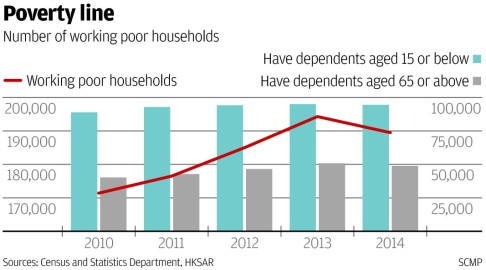JENNIFER NGOjennifer.ngo@scmp.com
PUBLISHED : Wednesday, 30 September, 2015, 4:17am
UPDATED : Wednesday, 30 September, 2015, 4:17am
A woman and her son in a subdivided flat. About 1.34 million Hong Kong people live below the poverty line.Photo: Reuters
The number of working poor families - households living under the poverty line with at least one member holding down a job - increased by 10 per cent in five years to 190,000 families, even though the government claims to have been tackling the problem since 2013.
An Oxfam Hong Kong report pointed out that another 18,100 families have fallen into poverty, taking the total number of people in working poor households to 647,500 - accounting for half of Hongkongers living below the poverty line.
While living has become harder for the working class, Hong Kong's richest 1 per cent held half of the city's wealth last year, the report also indicated.
The 25 richest Hongkongers have amassed HK$1.513 trillion - more than the Hong Kong government's reserves of HK$1.5 trillion.
"Since [the government] was supposedly dealing with the poverty issue in the past few years, the number should be on the decrease. To have a double-digit rise is quite a lot, and means that what we've done so far is not enough," said Oxfam programme manager Wong Shek-hung.
Wong attributed the problem to bad labour policies, including a minimum wage that is not sufficient to meet the basic needs of living in the city and cover inflation, and the mandatory provident fund (MPF) offset mechanism - where the practice of using MPF contributions intended for retirement to offset severance and long-service payments - which has long been seen as unfair to employees.
From next year, the government is set to pay low-income family assistance to working poor families with children. But Wong said although it was welcome, it would not be enough to deal with the poverty issue.
Labour Party lawmaker Lee Cheuk-yan said poverty among workers was created by the government because of skewed labour policies.
"The MPF offset won't make someone poor immediately," he said.
"But when you retire, you can immediately fall into poverty. It's a delayed problem but it will be huge when it happens."
Lee also criticised the government for reviewing its policy on the minimum wage only once every two years, while inflation rises every year.
Wong Hung, associate professor of social work at the Chinese University, said the 10 per cent increase was an obvious surge and evidence that Hong Kong had changed. Holding a job would not necessarily provide enough to cover living expenses, he noted.
"In the past five years our economy hasn't been bad and the unemployment rate has been low, but the jobs available do not pay well, and there is low labour protection," said Wong.
"Most are contract or part-time jobs. This explains why there are more working poor."
Of the number of working poor, only 7.5 per cent are on welfare - Comprehensive Social Security Assistance - while 53.6 per cent live on a monthly income of less than the average welfare payment.
Around 1.34 million Hongkongers live below the poverty line, which is set at half the median household income for each household size.
http://m.scmp.com/news/hong-kong/economy/article/1862580/working-poor-households-increase-alarmingly-despite-hong-kong
